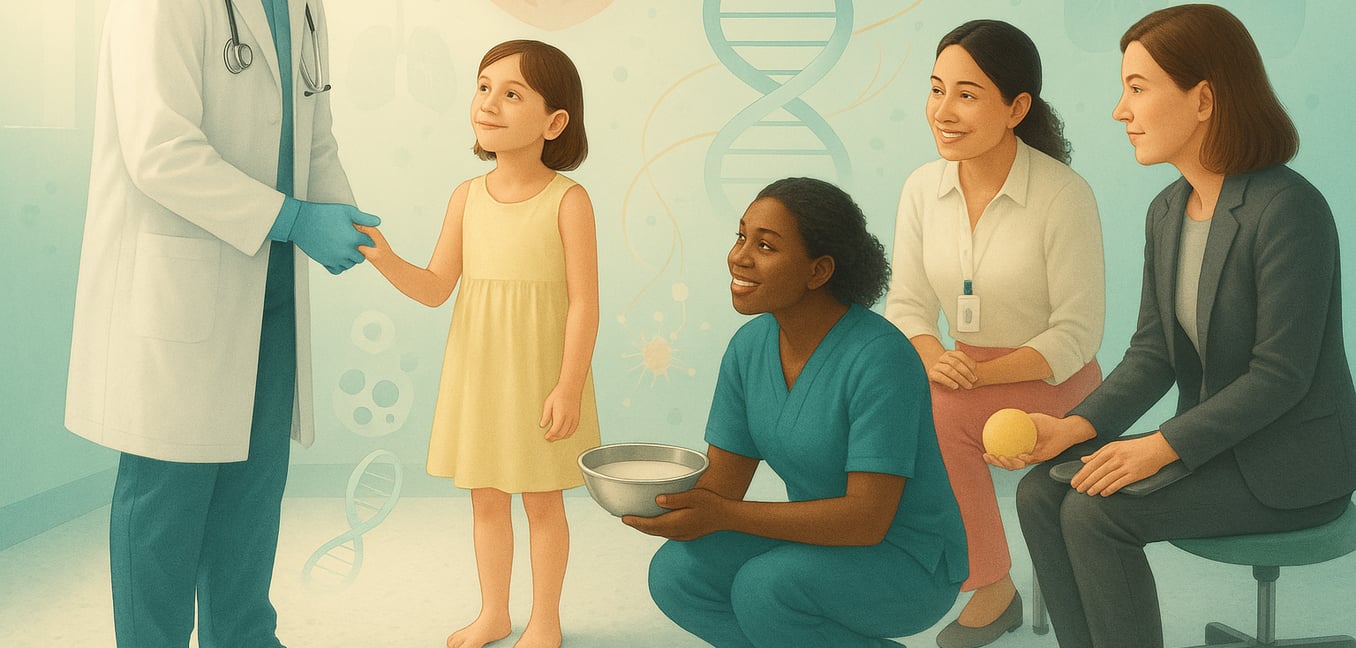Managing Noonan Syndrome: The Power of a Multidisciplinary Team
Noonan syndrome is a genetic condition that affects about 1 in 1,000 to 2,500 people, causing a wide range of physical and developmental challenges7. Because it can impact many different parts of the body simultaneously, managing the condition requires a coordinated team of specialists4.
Individuals with Noonan syndrome often face a unique combination of health concerns7. Congenital heart defects are common, requiring lifelong monitoring. Many infants experience significant feeding challenges due to issues like a weak suck or reflux, which can affect growth and create stress for families7. Furthermore, developmental delays, hearing problems, and other medical conditions may be present7. Navigating these interconnected issues is why a multidisciplinary team is not just helpful, but essential for providing comprehensive care74.
The Core Care Team: Assembling the Specialists
Effective management of Noonan syndrome relies on a collaborative approach that brings together experts from various medical fields. This team works together to address the interconnected physical, developmental, and emotional needs of the individual46.
The Cardiologist
Since most individuals with Noonan syndrome have a congenital heart defect, a cardiologist is a cornerstone of the care team6. They use tools like echocardiograms to identify and monitor conditions such as pulmonary stenosis or hypertrophic cardiomyopathy62. Their ongoing care is crucial for managing heart health, which impacts everything from a child's energy levels and growth to their ability to tolerate exercise.
The Gastroenterologist and Nutritionist
To tackle common feeding problems, a gastroenterologist and a clinical nutritionist are invaluable partners7. The gastroenterologist can diagnose and treat underlying medical causes like gastroesophageal reflux disease, which can make eating a painful experience7. Working alongside them, the nutritionist develops personalized strategies to ensure the child receives adequate calories for growth, whether through modified diets, high-energy formulas, or the temporary use of a feeding tube7.
The Developmental Pediatrician and Therapists
A developmental pediatrician is key to monitoring a child's progress and coordinating support for any developmental delays4. They track milestones in motor skills, cognition, and speech, and can refer to a network of therapists for early intervention63. A speech-language pathologist can work on both communication and the oral-motor skills needed for safe swallowing, while an occupational therapist can help with fine motor skills and sensory issues that may contribute to food aversion7.
The Psychologist or Behavioral Specialist
Addressing the psychosocial impact of chronic medical challenges is a critical aspect of care. A psychologist or behavioral specialist can provide vital support for both the child and their caregivers7. For the child, they can use therapies to help overcome learned food aversions and manage anxiety related to medical procedures74. For parents, they offer coping strategies to navigate the stress of caregiving, helping to foster positive mealtime dynamics7.
How the Team Works Together: Communication and Coordination
Bringing together a team of specialists is the first step, but the true power of this approach lies in how these experts communicate and coordinate their efforts46. An integrated care model ensures that every member of the team is working from the same playbook64.
The Care Coordinator
A designated care coordinator, often a specialized nurse or social worker, can serve as the central point of contact for the family64. This person helps schedule appointments, facilitates the flow of information between specialists, and ensures that follow-up actions are completed64. By acting as a consistent guide, the care coordinator significantly reduces the logistical and emotional burden on parents64.
Multidisciplinary Clinic Days
Consolidated clinic days, where the patient can see several key specialists during a single visit, are highly effective64. This model saves families the stress of multiple trips and allows for direct, real-time consultation among providers. The cardiologist can immediately discuss a finding with the gastroenterologist, leading to a more cohesive and unified care plan that is communicated clearly to the family3.
Shared Health Records
Utilizing a shared electronic health record (EHR) is fundamental for modern, coordinated care63. When all specialists can access the same up-to-date patient chart, it creates a holistic picture of the child’s health63. This seamless sharing of information prevents redundant testing, reduces the risk of medical errors, and ensures that every decision is made with the full clinical context in mind3.
Regular Team Conferences
Regular team conferences, whether in-person or virtual, provide a dedicated forum for the care team to proactively manage a child’s case4. These meetings allow specialists to collaboratively review progress, anticipate future needs, and troubleshoot complex challenges4. This proactive approach ensures the care plan is a dynamic, forward-looking strategy designed to optimize long-term health63.
A Holistic Approach: Supporting the Entire Family
A truly comprehensive approach recognizes that the journey with Noonan syndrome affects the entire family64. Supporting the emotional, educational, and practical needs of caregivers is a fundamental component of the child’s overall care plan.
Educational Empowerment
Families can feel overwhelmed by the diagnosis, but providing them with clear and reliable information about Noonan syndrome is a powerful antidote to fear64. This means connecting them with resources that explain the condition’s variability and offer guidance on navigating the educational system7. When parents understand their child’s rights, they can more confidently advocate for necessary accommodations, such as an Individualized Education Program (IEP).
Peer-to-Peer Connections
While medical professionals provide expertise, the understanding that comes from another family walking a similar path is irreplaceable6. Patient advocacy groups and support networks offer a lifeline of practical advice and emotional solidarity6. These communities provide a safe space for parents to share triumphs and frustrations and realize they are not alone6.
Caregiver Wellness Support
The chronic stress and logistical demands of managing complex medical needs can take a significant toll on caregivers6. A holistic model integrates access to psychologists or counselors who specialize in working with families of children with chronic conditions4. This support helps caregivers develop coping strategies, manage stress to prevent burnout, and maintain a healthy family dynamic6.
Navigating Financial and Logistical Systems
The non-medical burdens of Noonan syndrome can be just as taxing as the clinical ones7. A social worker or case manager is a crucial team member who can help families navigate the worlds of health insurance, government assistance programs, and respite care services64. This practical support frees up parents’ energy, allowing them to focus more fully on their child7.










